- Home
- Vicki Delany
The Cat of the Baskervilles Page 5
The Cat of the Baskervilles Read online
Page 5
“That’s my goal,” Jayne said. “Marry a rich man, and take up a life of good works.”
Leslie smiled at her daughter. “I knew her husband, Ron, well. He was an absolutely marvelous man, and he and Rebecca were totally devoted to each other. Sometimes, honey, it does work out.”
A rap at the kitchen door announced the arrival of the first group of volunteers, interrupting our contemplation of marrying for love and money. Leslie admitted two women, all gray hair and excited giggles. “I’ve made us matching aprons,” she said, digging into her tote bag. “Put these on. Our first task is to set the tables. Jayne, do you have any special instructions?”
“Nope.” Jayne pointed to the boxes of plates, teacups, and cutlery delivered earlier from the rental supply place. A wheeled cart stood nearby to move everything around. “Have at it. Oh, one thing. The Sherlock Holmes teapot and matching cups go on the head table. If there’s no head table, then wherever Sir Nigel will be sitting. Do you know which table that is?”
Leslie pulled a piece of paper out of her apron pocket. “I have a seating plan. The guests will sit randomly, but the actors and other theater people are assigned to specific tables.” The new arrivals put on their aprons, and they trooped off.
“Gemma,” Jayne said, consulting her list of things to do. “The champagne glasses are supposed to be set up outside already and the Prosecco chilling in the outdoor fridge. Can you check, please?”
“Sure,” I said. “I have to go to the loo first. Where do you think it is?”
Jayne shrugged, and I wandered off in search. A passageway led off the entertainment room and I took it, assuming the facilities would be close to the kitchen and the telly. I opened a small door. What in this sort of house was no doubt called “the powder room” was tiny and gorgeous in feminine shades of peach and teal with a floral scent not at all overpowering, as artificial restroom scents usually are. I washed my hands with sea-green soap carved into the shape of a rose and dried them on a fluffy peach towel. I refrained from running the soft towel across my cheeks.
Instead of heading back through the TV room, my curiosity got the better of me, and I decided to take a quick peek into the next room, which appeared to be a library.
It was coming up to three o’clock, almost show time, but I forgot all about my errand and the impending arrival of a hundred and eight ticket holders the moment I stepped into the library. I sucked in a breath. Sherlock Holmes himself would be comfortable in a room exactly like this one when visiting an estate in the “green and pleasant countryside,” perhaps even Baskerville Hall itself. Floor to ceiling shelving filled two walls, and those shelves were crammed with books. A third wall was occupied by an enormous fireplace, not gas but wood-burning, and the fourth was all glass, looking out over the gardens to the sea. Red cedar floors gleamed, a red-and-gold Aubusson carpet filled the center of the room, and the paint on the walls was a shade of soft gold. A big couch of well-seasoned brown leather punctured with brass hobnails faced the fireplace, and two wingback chairs upholstered in red damask stood on either side. About the only thing Sherlock wouldn’t have encountered at Baskerville Hall was the huge chandelier hanging from the twenty-foot-high ceiling. The light fixture was made of glass, a multitude of sweeping, intertwining yellow-and-green strands. So pure was the glass and so brilliant the colors that this chandelier barely needed electricity; it caught the sunlight and glowed from within. I stepped closer and looked up. It was either a Dale Chihuly or a darn good imitation. Great Uncle Arthur had taken me sailing two winters ago in the Gulf of Mexico. We’d stopped at St. Petersburg and visited the Chihuly Center, where I’d fallen in love with the man’s stunning masterpieces of imagination, glass, and color. I’d wanted to take something home, but even the smallest Chihuly pieces were well beyond anything I could afford. I glanced around the room, taking in the rest of the details. A display cabinet tucked into a bookshelf contained another glass piece, this one a large bowl of intertwined green and yellow inspired by the inside of a sea shell. A smaller version in blue and yellow, about two inches long and an inch wide, lay beside it. Another display case held two cute glass sculptures resembling chocolate kisses.
Stunningly beautiful.
“Gemma!”
I tore myself away from admiration of the sculptures. Jayne stood at the entrance to the library, hands on hips, scowl on face. “What on earth are you doing in here? Did you check the wine?”
“Wine? I thought we were serving tea.”
“The Prosecco. I sent you outside to make sure the wine’s chilled and the glasses ready. For heaven’s sake, Gemma, you’ve been gone so long, I thought I’d better look for you.”
“Sorry,” I said. “Got distracted. I’ll do it now.”
“Never mind. I called Mom to ask if you were out there, and she said she’d do it. I need you in the kitchen.”
“Coming, boss. Did you notice the chandelier? If it’s an original, it’s gotta cost in the twenty to fifty thousand range. If they have a piece like this in the library, I wonder what they have in the front hall and living room.”
“Don’t you dare wander off for a peek. We haven’t been invited to make ourselves at home or to admire the decor, you know. The rest of the volunteers are here, including Mrs. Franklin, walker and all. Mom intercepted her before she could reach the kitchen and assigned her to a table at the gate checking tickets. So that’s one potential disaster avoided.”
I peeked out the windows. People had begun to arrive, among them Pat Allworth, the director, and Eddie Barker, the understudy. I didn’t see Sir Nigel or his shadow, Gerald. Smiling women in pink-trimmed aprons circulated with Prosecco.
“What do you need me to do?” I asked Jayne as we went into the kitchen.
“Start arranging the trays. You know the layout, sandwiches on—”
“Sandwiches on the bottom tier, scones in the middle, tarts and cookies on the top. As immortalized by Anna, Duchess of Bedford, in—”
“Thank you, Gemma. I am aware of the history of afternoon tea.”
I harrumphed. I’d once suggested that rearranging the contents of the trays into consistency of shape rather than according to tradition would be more visually appealing, and Jayne had bitten my head off. Sometimes Americans could be more tied to English traditions than we British.
We worked in silence for a while. I couldn’t see the garden, but I could hear the increasing sound of excited chatter as guests arrived. The food would be served all at once on the three-tiered trays, so as soon as everyone sat down, all we had to do was keep the teapots refreshed. To simplify things, Jayne had selected only two types of tea. Earl Grey and Darjeeling. Then reluctantly, she’d added a decaf green tea. Reluctantly, because it was unlikely Queen Victoria or Anna, Duchess of Bedford, had worried about their caffeine consumption.
“We’re good here for now,” Jayne said once the trays were all neatly assembled, the kettles full, and the china pots ready with fresh loose tea leaves. Jocelyn poured herself a glass of water from the dispenser on the fridge.
“Gemma,” Jayne said. “Do you know where my mom is?”
“She went out to see if Mrs. Franklin was okay at her table, but I haven’t seen her since.”
“You can do something for me then. Take a look outside, and make sure the tables are set correctly. Take my camera, will you? It’s in my tote bag. Snap some pictures of the tables and the place settings. Close up as well as panoramic pictures. Things we can use for advertising.”
I rummaged in her bag and pulled out a compact camera. “Got it.”
“Start counting to five. Now.”
“Why am I counting to five?”
“Because when you reach five, I want you standing outside. Not wandering around the house gaping. Got it?”
“One,” I said. I was through the French doors, out of the house, and on the back patio by the time I reached four.
As if the kitchen in the house wasn’t enough, there was a full outdoor kitchen as well
. Stainless-steel barbecue approximately large enough to grill a whole ox, rows of fancy (and spotlessly clean) cooking implements hanging on hooks, countertops, cabinets, fridge, a table that would seat twelve, and a fire pit around which more chairs were arranged. Presumably this kitchen and outdoor dining area was used only in the summer months, but it was a heck of a lot better equipped than the one in my house.
Fortunately, considering the heat of the day, the fire pit was not lit. The barbecue was covered, and the cabinets closed. One of Leslie’s white-and-pink-aproned volunteers poured drinks at the long bar counter. Three other women, wreathed in huge smiles, circulated with crystal glasses on silver trays. Some of the elderly guests had taken chairs on the patio, but most milled about, holding glasses of Prosecco or sparkling water. Everyone was dressed in their best as suited a summer afternoon. The women wore colorful dresses, and a few even sported wide-brimmed hats; the men were in sports jackets or open-necked shirts over well-ironed trousers. One or two of the older men wore suits and ties.
“Nice turnout,” said a voice beside me. I turned to see a smiling Eddie.
“We’re lucky with the weather,” I said. A canvas event tent had been erected on the lawn, but it wouldn’t be necessary. The only clouds in the sky were light and white and fluffy.
“Is your friend here?” Eddie asked.
“My friend?”
“The woman from the tea room. Jayne, is it? I, uh . . . wanted to say hi.”
“She’s in the kitchen but super busy, as you can imagine.”
“Do you think she’d mind if I popped in to say good luck?”
I hesitated. Rebecca hadn’t said anything about not allowing people into the house, and no one was standing guard next to the French doors. “I suppose that’ll be okay. The kitchen’s through there.”
He gave me a wink and slipped inside after taking a quick detour to nab a glass of Prosecco off the bar.
I crossed the lawn, heading for the tent, taking pictures as I went. The twelve round tables were covered in crisp white cloth, their edges fluttering in the breeze. Ten chairs surrounded each table. The flower beds were a riot of carefully controlled color. The property sloped downward to end at a cliff overlooking the ocean, and a patch of woods ran along the right side of the perfectly maintained lawn. In the distance, boats skimmed across sparkling blue waters, their colorful sails running before the wind.
“Hey, Gemma!” Irene Talbot broke away from the pack around the bar and trotted toward me, a black Nikon camera slung around her neck.
“Are you here working?” I asked her. Irene was a reporter for the West London Star. In these days of declining newspaper subscriptions and budget cuts, she was the only full time reporter they had, so she covered everything from murder to high school sports games to society events.
“Yup. This is a big shindig. It’s got it all. Sir Nigel Bellingham, representatives of some of Cape Cod’s oldest—not to mention richest—families, and the Stanton house, which is never opened to the public. I’m only allowed to take pictures until the group sits down to tea, and then they’ll release the hounds if I’m not off the property, so I’d better get busy. Smile!” She lifted her camera, but I didn’t bother to pose. With all the beauty, natural and human, around me to photograph, my scowling visage would not be used to grace the pages of the West London Star. Irene trotted off. She wasn’t the only one snapping away. Many people had phones or cameras out and were asking friends to take pictures of them with the actors.
I spotted Pat Allworth, dressed in wide-legged capri-length black trousers and a navy-blue cape, chatting to a cluster of blue-rinsed, diamond-ringed matrons. She wore black mesh shoes with four inch heels that flared out at the bottom to make a gold star. Rebecca would not be pleased if Pat marched across her perfect lawn, stamping stars into the grass as she went. Sir Nigel had arrived, and he was standing at the bar, accepting a glass while Gerald hovered at his elbow and a group of women milled around them, wondering if it was appropriate to approach the great man. Eddie was probably still chatting up Jayne in the kitchen. Renee was hiding in a patch of shrubbery smoking, phone to her ear. She’d apparently not gotten the memo about circulating with the guests or about suitable attire for afternoon tea. She wore short (very short) white denim shorts, a low-cut red T-shirt tucked into a wide black belt, and sunglasses that covered half her face. A giant red beach bag was tossed over the shoulder, and her shoes were red espadrilles with cork platforms.
I was about to continue on my way when Rebecca hurried up to the actress, her face like a thundercloud. She snapped at Renee, and the younger woman glared at her. Rebecca made angry gestures to the cigarette, and Renee dropped it and ground it beneath her shoe. Rebecca then pointed to the crowd of people behind her. Slowly and deliberately, Renee said something into her phone before switching it off and dropping it into a side pocket of her bag. She patted her hair and sauntered across the lawn, straight toward a circulating waitress. She snagged a fresh glass of Prosecco. Rebecca caught me looking and gave me a grimace.
“Everything okay?” I asked.
“I hate actors. Every single one of them. It’s why I left the theater world. I don’t know why I took this on.”
“It all seems to be going splendidly,” I said.
“Are you ready in the kitchen?”
“I’m doing a last minute check of the table settings, and then we’re good to go.”
“At least Nigel got here on time. Might have had something to do with the serving of drinks. He’s another one I had to tell not to smoke on my property. Aside from the fact that my husband was a two-pack a day smoker who died of lung cancer and every whiff I catch of tobacco reminds me of him, my guests do not want cigarette-breath in their faces. I’ll do the welcome in five minutes. Thank everyone for coming, introduce the cast, and ask them to be seated.” She headed toward the house, her own heels digging into the immaculate lawn, and I continued on to the tent.
“Quite the do,” a man’s voice said behind me.
I turned with a smile. “So it is. I’m surprised to see you here. I didn’t know you were interested in theater.”
“Not particularly.” Grant Thompson fell into step beside me. “As I’m new in town, I’m interested in making the acquaintance of the sort of people who have money to buy what I sell.”
Grant had dressed for today’s event in slim-fitting khaki Dockers, beige belt, and a recently ironed blue-and-white checked button-down shirt. A trace of black stubble showed on his strong jaw, and the damp air had curled his thick brown hair. He was a rare book dealer who specialized in Victorian and Edwardian detective fiction. We’d met when a potentially extremely valuable item had come (briefly) into my possession. The Emporium is strictly retail and doesn’t handle rare books, but Grant and I had continued our friendship.
Was it more than friendship? Grant was a charming, handsome single man. We had a lot in common. We both loved books and made our living from them. He’d lived in England for a time. He seemed to like me. But I wasn’t entirely sure what our relationship was, or even what I wanted it to be.
“Good luck then,” I said.
“Everything looks great,” he said.
And it did. Crisply ironed white linen cloths, white paper napkins printed with the Mrs. Hudson’s logo, china teacups with matching plates, silver polished to a high shine. A local florist had donated the flowers, and Mrs. Wilson’s volunteers had arranged centerpieces of miniature pink and yellow roses accented with a touch of greenery inside teacups. Each of the twelve tables had one place card, marking the table’s host, an actor, or a person otherwise involved in the production, such as the director, the wardrobe mistress, and the set designer. I took more pictures.
Some of the guests were already checking out the seating, no doubt planning to nab a place at the best table. One woman put her handbag on a chair to mark her place. It was the head table, the one for Sir Nigel, with the Sherlock Holmes-themed dishes.
“I’ll catch you
later,” I said to Grant. “If I don’t report back for duty, Jayne’ll have my guts for garters.”
The green flakes in his brown eyes twinkled. “I do miss those English expressions some times.”
I gave him a grin and then headed back to the kitchen to report to Jayne that we were about to begin. Before I reached the house, I was waylaid by Donald Morris, a prominent and somewhat eccentric Sherlockian. Today, Donald had dressed the part in an ulster—a calf-length overcoat with cape and sleeves—and his habitual deerstalker hat. Ulsters are mentioned in A Study in Scarlet and The Blue Carbuncle, neither of which were set in North America in the middle of summer.
“Aren’t you hot in that getup?” I said somewhat rhetorically, as if beads of sweat weren’t forming at Donald’s temples and a drip hesitating at the end of his nose, ready to drop off.
“Somewhat,” he admitted, fumbling in his pocket for a handkerchief. “I thought we’d be inside the house.” He wiped his face.
“I’ll take your coat into the kitchen if you want,” I said.
With a sigh of relief, he pulled it off and handed it to me. Underneath the coat, he wore a clean button-down shirt and pressed trousers. “I have an item you might be interested in purchasing, Gemma.”
“Not now, Donald. I’m kinda busy here. Jayne and I are doing the tea, you know.”
“This won’t take but a moment. I have a playbill from Sir Nigel’s run of The Hound of the Baskervilles at the Shaftsbury Theater in London. It’s been signed by Sir Nigel and others of the cast. Do you want to buy it?”
“No,” I said, and I walked away, carrying Donald’s ulster. He’d quit his law practice prematurely to concentrate on his love of all things Holmes. Whereupon he found out that Sherlock doesn’t provide much of a living. I was surprised Donald had been able to afford the two hundred dollars for a ticket to this tea.
Nigel Bellingham was surrounded by guests, and Gerald hovered nervously at the edges of the circle. As I passed, two people broke away, and Nigel spotted me through the gap. “There she is!” he cried. “My English rose. You don’t have a drink in hand, my dear. Gerald, see to that.”

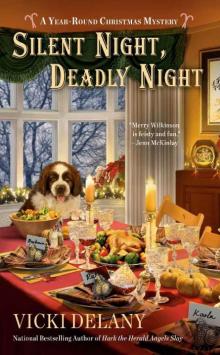 Silent Night, Deadly Night
Silent Night, Deadly Night Coral Reef Views
Coral Reef Views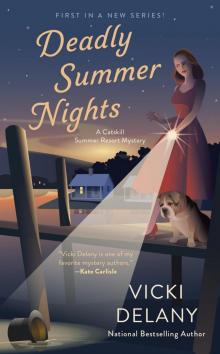 Deadly Summer Nights
Deadly Summer Nights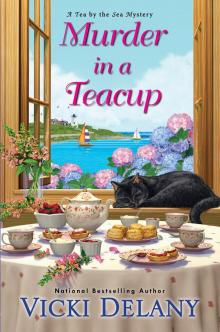 Murder in a Teacup
Murder in a Teacup Whiteout
Whiteout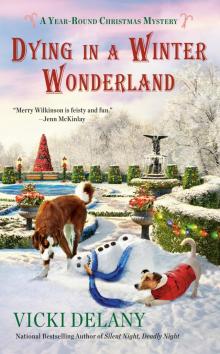 Dying in a Winter Wonderland
Dying in a Winter Wonderland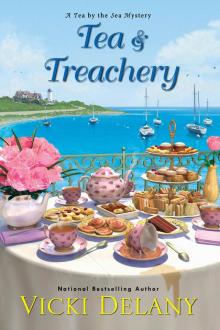 Tea & Treachery
Tea & Treachery Rest Ye Murdered Gentlemen
Rest Ye Murdered Gentlemen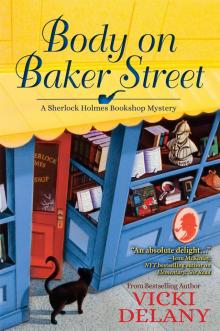 Body on Baker Street: A Sherlock Holmes Bookshop Mystery
Body on Baker Street: A Sherlock Holmes Bookshop Mystery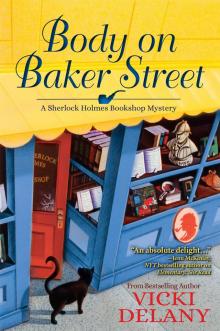 Body on Baker Street
Body on Baker Street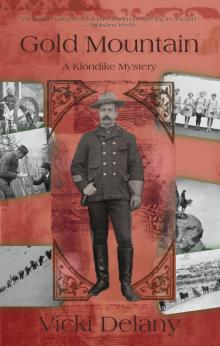 Gold Mountain
Gold Mountain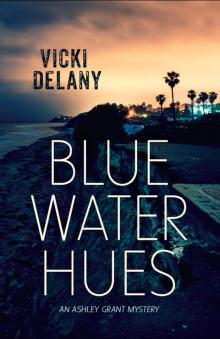 Blue Water Hues
Blue Water Hues Hark the Herald Angels Slay
Hark the Herald Angels Slay Murder at Lost Dog Lake
Murder at Lost Dog Lake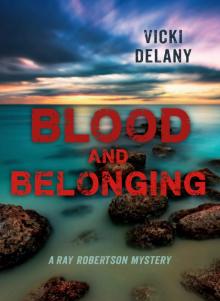 Blood and Belonging
Blood and Belonging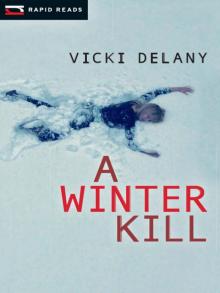 A Winter Kill
A Winter Kill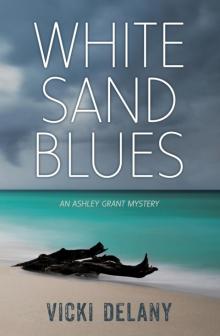 White Sand Blues
White Sand Blues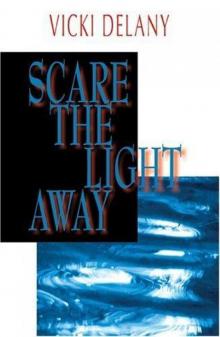 Scare the Light Away
Scare the Light Away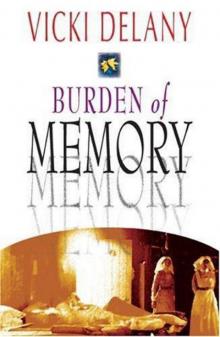 Burden of Memory
Burden of Memory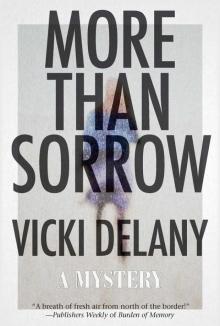 More Than Sorrow
More Than Sorrow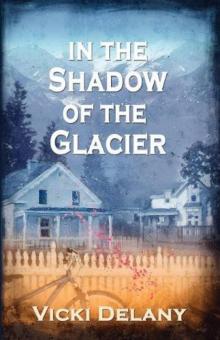 In the Shadow of the Glacier
In the Shadow of the Glacier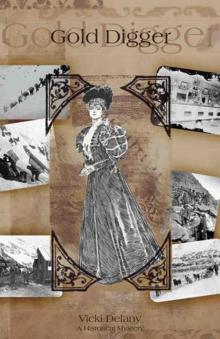 Gold Digger: A Klondike Mystery
Gold Digger: A Klondike Mystery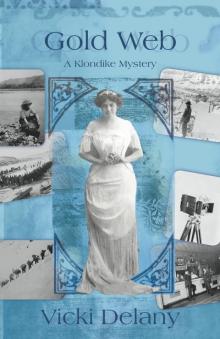 Gold Web
Gold Web Haitian Graves
Haitian Graves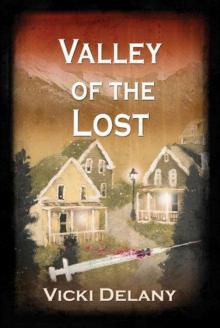 Valley of the Lost
Valley of the Lost We Wish You a Murderous Christmas
We Wish You a Murderous Christmas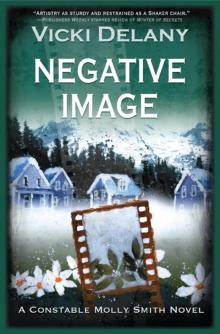 Negative Image
Negative Image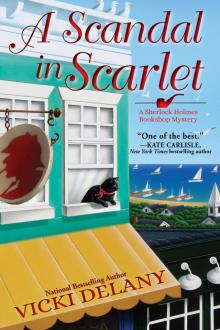 A Scandal in Scarlet
A Scandal in Scarlet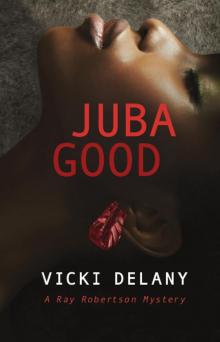 Juba Good
Juba Good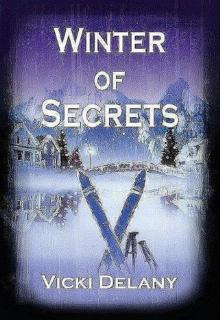 Winter of Secrets
Winter of Secrets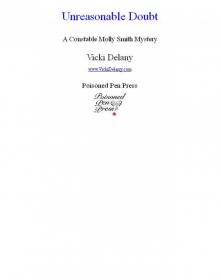 Unreasonable Doubt
Unreasonable Doubt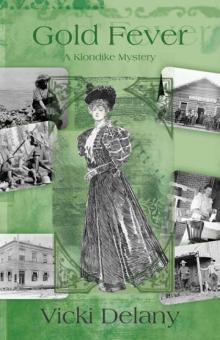 Gold Fever
Gold Fever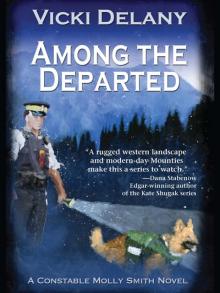 Among the Departed
Among the Departed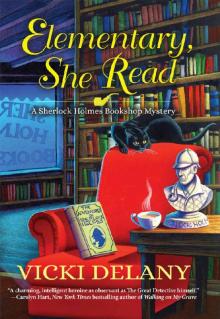 Elementary, She Read: A Sherlock Holmes Bookshop Mystery
Elementary, She Read: A Sherlock Holmes Bookshop Mystery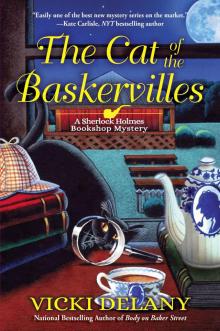 The Cat of the Baskervilles
The Cat of the Baskervilles